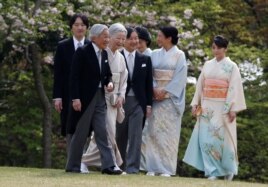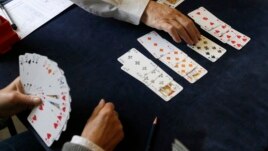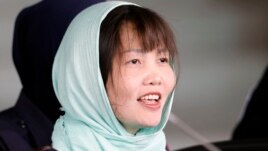Japanese officials have chosen a name for the period of rule of Japan's incoming emperor.
日本官员为下一任天皇择定了一个年号。
Chief Cabinet Secretary Yoshihide Suga announced the name on Monday in Tokyo.
日本内阁官房长官菅义伟于周一在东京宣布了这个年号。
Crown Prince Naruhito will become emperor on May 1, one day after Japanese Emperor Akihito leaves the position. This will be only the second time in nearly 100 years that Japan has welcomed a new era.
皇太子德仁将在5月1日成为天皇,也就是明仁天皇退位一天之后。这将是近100年来日本第二次迎来新的纪年。
Although use of the era is not required by Japanese law, it is widely used on government and business papers, calendars and other documents.
虽然日本法律不强制要求使用纪年,但是它被广泛用于政府和商业文件、日历以及其它文档。
The current era, known as "Heisei" under Emperor Akihito, has lasted 30 years. The term is often defined as meaning "peace prevails everywhere." During that period, Japan has not been involved in a war, but has experienced natural disasters and economic troubles.
目前是明仁天皇的平成纪年,已经持续了30年。平成这个词通常被解释为“四海和平。”在此期间,日本没有卷入战争,但是经历了自然灾害和经济困难。
The new era is to be called "Reiwa." It was chosen by a group appointed by the government from names suggested by scholars.
新的纪年被称为“令和”。它是由政府任命的一个小组根据学者们提出的名称来选定的。
Rules require that the name have two Japanese characters, known as Kanji, which are easily read and written but are unusual or literary in nature. The first character can be defined to mean "order" and the second as "harmony" or "peace."
规定要求年号有两个日本汉字,它易于阅读和书写,但是不太常见,或是本质上具有文学特征。新年号令和的第一个字可以解释为秩序,第二个字可以解释为和谐或和平。
The term comes from a poem about plum blossoms in a collection of Japanese poems called "Manyoshu." It is said to have been written about 1,300 years ago.
这个词出自于日本诗歌集《万叶集》中一首关于梅花的诗,据称写于大约1300年前。
After the announcement, Japanese Prime Minister Shinzo Abe spoke about the meaning of Reiwa. Abe described it as: "culture is born and nurtured as the people's hearts are beautifully drawn together." He expressed his wishes that the new era would be "filled with hope."
日本首相安倍晋三在新年号宣布后,谈到了令和这个年号的意义。安倍称其为:“文化在人们美丽心灵相互靠近之中诞生并成长”。他表示希望这个新的纪年会充满希望。
Over more than one thousand years, Japanese era names have come from Chinese classic literature. Abe said the "Manyoshu" was chosen because it was Japan's oldest collection of poetry written by royal family members and ordinary people.
一千多年来,日本的年号都取自中国古典文学。安倍表示,选择《万叶集》是因为这是日本最古老的诗集,由王室成员和普通百姓写成。
Abe has expressed support for the image of the emperor, who enjoys wide public support.
安倍表达了对天皇形象的支持,天皇享有广泛的公众支持。
Japan's current constitution was written after World War II. The constitution denounces war and gives the emperor no political power.
日本现行宪法是在二战之后编写的。这部宪法谴责战争,并剥夺了天皇的政治权力。
Emperor Akihito gained what is known as the Chrysanthemum Throne in 1989 after the death of Hirohito, Japan's emperor during World War II.
明仁天皇于1989年裕仁天皇去世后继承了王位。裕仁天皇是日本二战期间的天皇。
I'm Mario Ritter.
我是马里奥·里特。(51VOA.COM原创翻译,禁止转载,违者必究!)
By Mario Ritter Jr.01 April, 2019
Japanese officials have chosen a name for the period of rule of Japan's incoming emperor.
Chief Cabinet Secretary Yoshihide Suga announced the name on Monday in Tokyo.
Crown Prince Naruhito will become emperor on May 1, one day after Japanese Emperor Akihito leaves the position. This will be only the second time in nearly 100 years that Japan has welcomed a new era.
 Japan's Emperor Akihito, flanked by Empress Michiko, leads his royal family members Crown Prince Naruhito (C), Crown Princess Masako (2nd R), Prince Akishino (L), Princess Kiko (3rd R) and their daughter Princess Mako to greet guests.
Japan's Emperor Akihito, flanked by Empress Michiko, leads his royal family members Crown Prince Naruhito (C), Crown Princess Masako (2nd R), Prince Akishino (L), Princess Kiko (3rd R) and their daughter Princess Mako to greet guests.Although use of the era is not required by Japanese law, it is widely used on government and business papers, calendars and other documents.
The current era, known as "Heisei" under Emperor Akihito, has lasted 30 years. The term is often defined as meaning "peace prevails everywhere." During that period, Japan has not been involved in a war, but has experienced natural disasters and economic troubles.
The new era is to be called "Reiwa." It was chosen by a group appointed by the government from names suggested by scholars.
Rules require that the name have two Japanese characters, known as Kanji, which are easily read and written but are unusual or literary in nature. The first character can be defined to mean "order" and the second as "harmony" or "peace."
The term comes from a poem about plum blossoms in a collection of Japanese poems called "Manyoshu." It is said to have been written about 1,300 years ago.
After the announcement, Japanese Prime Minister Shinzo Abe spoke about the meaning of Reiwa. Abe described it as: "culture is born and nurtured as the people's hearts are beautifully drawn together." He expressed his wishes that the new era would be "filled with hope."
Over more than one thousand years, Japanese era names have come from Chinese classic literature. Abe said the "Manyoshu" was chosen because it was Japan's oldest collection of poetry written by royal family members and ordinary people.
Abe has expressed support for the image of the emperor, who enjoys wide public support.
Japan's current constitution was written after World War II. The constitution denounces war and gives the emperor no political power.
Emperor Akihito gained what is known as the Chrysanthemum Throne in 1989 after the death of Hirohito, Japan's emperor during World War II.
I'm Mario Ritter.
Steve Miller reported this story for VOA News. Mario Ritter Jr. adapted it for VOA Learning English, with additional materials from the Associated Press. George Grow was the editor
We want to hear from you. Write to us in the Comments section, and visit 51VOA.COM..
______
Words in This Story
era – n. a period of time linked to a quality, event or person
prevail – v. to succeed, to defeat an opponent after a long struggle
character – n. a symbol, letter or number used in writing or printing
scholar – n. a learned person; someone who studies under a teacher
nurture – v. to help someone or something grow, develop and succeed
ordinary – adj. normal or average; common











